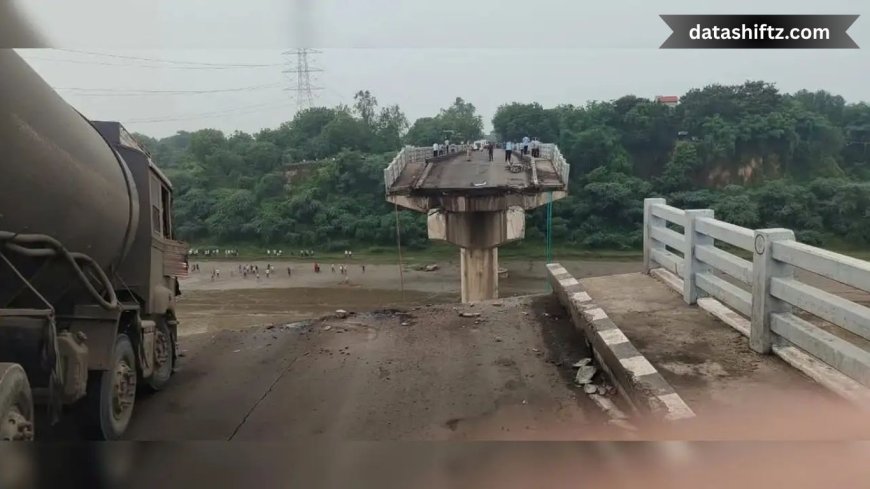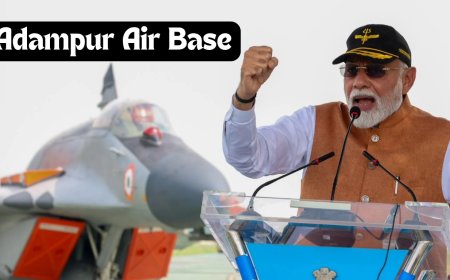Gambhira Bridge Collapse Today: Critical Update

On July 9, 2025, tragic news emerged from Gujarat when a section of the Gambhira Bridge — connecting Anand and Vadodara over the Mahisagar River — suffered a structural failure. The incident led to multiple vehicles plunging into the water, resulting in fatalities, injuries, and a deeper concern about regional infrastructure safety.
What Happened? A Timeline of Events
A swift series of events unfolded early this morning:
-
~9:15 AM IST: Part of the Gambhira Bridge gave way, creating a sudden chasm.
-
Immediately after: Several vehicles — including light vehicles and a truck — fell into the Mahisagar River.
-
First responders on site: Emergency teams rushed to the scene. Rescue operations were underway.
-
Casualties: At least two people died, and ten others suffered injuries, with three to four critically injured.
-
Local impact: Disrupted traffic, emotional trauma, and immediate roadblocks.
The bridge is vital for traffic between Anand and Vadodara. The failure raised urgent questions about its age, maintenance, and oversight .
Why Did the Collapse Happen?
Several factors are being examined:
-
Structural Weakness
-
Reports indicate the bridge had weakened under heavy monsoon flow, with previous visible potholes and temporary repairs.
-
-
Neglected Maintenance
-
Drivers and local residents had reported rising cracks and erosion shortly after a ₹1.75 crore overhaul in 2020, hinting at poor quality work.
-
-
Increased Load & Corrosion
-
Regular heavy-vehicle transit may have exacerbated wear-and-tear, stressing control measures.
-
-
Delayed Official Action
-
Despite visible warning signs (potholes, cracks), no substantial corrective measures were taken before collapse.
-
Incident Summary
| Aspect | Details |
|---|---|
| Date & Time | July 9, 2025, ~9:15 AM IST |
| Location | Gambhira Bridge, Mahisagar River (Padra Mujpur, Vadodara district) |
| Casualties | 2 dead, 10 injured (3–4 critical) |
| Bridge History | ₹1.75 crore repairs done in 2020, then potholes reappeared |
| Preliminary Cause | Structural failure due to corrosion, load stress, neglect |
| Authorities' Action | High‑level inquiry ordered, rescue & relief underway |
| Local Impact | Traffic disrupted, residents anxious, repair & reconstruction timeline TBD |
Immediate Consequences & Emergency Response
-
Swift search-and-rescue actions focused on recovering vehicles and injured passengers.
-
Local officials, including the Vadodara District Collector, quickly cordoned off the area; Amit Chavda (Congress) called for urgent alternate routes to ease traffic congestion .
-
Traffic disruption was severe: detours through Anand and nearby rural roads caused delays and confusion .
-
Compensation plans were announced for the families of the deceased.
-
A high-level structural audit has been commissioned to assess all bridges in the region.
Why This Should Matter to You
-
Public Safety: Bridges are lifelines — unsafe ones threaten lives.
-
Infrastructure Quality: The incident highlights deeper issues in the quality of repair and inspection standards.
-
Policy Oversight: Timely review and policy enforcement are essential to avoid repeat disasters.
-
Citizen Vigilance: Public reporting of structural anomalies can save lives.
What Happens Next? Rebuilding & Prevention
Authorities are expected to follow these steps:
-
Full Structural Audit: Inspect the entire bridge and nearby infrastructure.
-
New Design & Construction:
-
Propose a permanent replacement — potentially a multi-span reinforced concrete bridge.
-
-
Maintenance Protocols: Establish periodic inspections, especially during monsoon season.
-
Alternate Routes:
-
Establish temporary ferry services or local bypass roads for traffic relief.
-
-
Legislative Measures:
-
Amend local laws to require bridge safety certificates every 2–3 years, and full rehabilitation every 15–20 years.
-
-
Community Involvement:
-
Engage residents in reporting potholes and cracks.
-
Lessons from the Collapse
-
Don’t wait to fix cracks: Temporary patch‑ups can fail catastrophically.
-
Audit periodically: Infrastructure needs regular, thorough inspections.
-
Plan detours ahead: A collapse affects thousands; alternate routes save time and lives.
-
Transparency matters: Citizens must be informed early about structural concerns and risks.
-
Accountability is vital: Authorities and contractors must face review — negligence cannot go unpunished.
Final Thoughts
The Gambhira Bridge collapse is more than a local tragedy—it’s a wake-up call on infrastructure vulnerability. While rescue efforts continue and plans for rebuilding are drafted, the incident underscores the vital need for proactive maintenance and public vigilance.
This should catalyze:
-
Government action: Audits, clear safety protocols, and modern design standards.
-
Public awareness: Citizens empowered to report visible faults.
-
Long-term safety: Ensuring bridges across India are built to last.




























